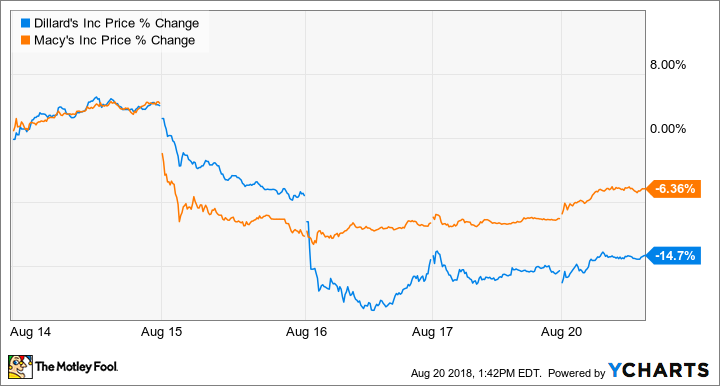Dillard's Stock Plunges More Than Macy's, Despite a Q2 Earnings Beat
Shares of Macy's (NYSE: M) plunged 16% last Wednesday, after the department store giant posted second-quarter results that easily exceeded management's projections but still didn't meet investors' lofty expectations.
Yet that big post-earnings plunge didn't make Macy's the worst-performing department store stock of the past week. Shares of J.C. Penney and Sears Holdings have plunged about 30% during the same period, after those companies reported bad news last week. Even regional department store chain Dillard's (NYSE: DDS) -- which, like Macy's, posted better-than-expected Q2 results -- has experienced a steep sell-off in the past few days.
Macy's vs. Dillard's Stock Performance, data by YCharts.
Last week, I wrote that the Macy's sell-off seemed misguided, even though the stock was still up more than 40% year to date. However, while Dillard's stock has lost even more ground than Macy's stock in the past week, it seems like much less of a bargain based on recent sales, earnings, and cash flow trends.
Better results than a year ago
A year ago, Dillard's reported dreadful results for the second quarter, as the company paid the price for entering the quarter with too much inventory. Gross margin plunged by 235 basis points -- 1 percentage point equals 100 basis points -- causing the company to lose $17.1 million ($0.58 per share), compared to earnings per share (EPS) of $0.35 in the prior-year period.
Dillard's performance improved significantly in the second quarter of 2018. Comparable store sales rose a modest 1% year over year, while gross margin improved by 163 basis points, recovering most of the decline recorded a year earlier.
As a result, Dillard's loss narrowed to $2.9 million, or $0.10 per share. While management was disappointed to post a quarterly loss again, analysts had, on average, expected a much bigger loss of $0.44 per share. Importantly, the second quarter tends to be the weakest part of the year for Dillard's.

Dillard's recorded a small loss for the second quarter of fiscal 2018. Image source: Author.
Still nothing to write home about
For the first half of fiscal 2018, comp sales increased slightly less than 2% at Dillard's. That compares to a 2.3% increase at Macy's during the same period. While operating income is up 20% year to date at Dillard's, that still trails Macy's 30% year-to-date surge in operating income (excluding asset sale gains and impairment charges).
Furthermore, Dillard's cash flow remains under pressure. The company's free cash flow plunged from around $400 million in fiscal 2016 to less than half that level last year. In the first half of fiscal 2018, Dillard's has burned just over $100 million, compared to cash burn of $44 million in the first half of fiscal 2017. While Macy's free cash flow is down modestly year to date, it still remains firmly in positive territory.
Of course, retailers tend to generate the vast majority of their free cash flow in the second half of the year, driven by holiday season sales. However, as free cash flow production has eroded, Dillard's has had to cut back on share buybacks, a key driver of EPS growth in recent years.
Macy's still looks like the better bet
Following Macy's recent guidance increase, shares of the No. 1 department store operator trade for just nine times projected 2018 earnings -- or 11 times earnings excluding asset sale gains. By contrast, Dillard's stock trades for 12 times analysts' updated estimates.
One potential justification for Dillard's stock carrying a higher earnings multiple than Macy's is that it has much less debt. That said, Macy's is steadily improving its own balance sheet.
Additionally, Macy's is in the early stages of capitalizing on several sales growth initiatives, led by the expansion of its Backstage off-price concept. Dillard's doesn't have any equivalent sales drivers, as management has prioritized share buybacks over investments in the business. During the next 12 months, Macy's will also be a bigger beneficiary of the liquidation of regional department store operator Bon-Ton than Dillard's.
In short, while Dillard's stock has fallen by double digits despite posting better-than-expected Q2 earnings, it still doesn't look like a bargain. Macy's is better-positioned to grow sales and earnings in the face of tough industry conditions -- and its stock is cheaper, to boot.
More From The Motley Fool
Adam Levine-Weinberg owns shares of J.C. Penney and Macy's. The Motley Fool has no position in any of the stocks mentioned. The Motley Fool has a disclosure policy.

